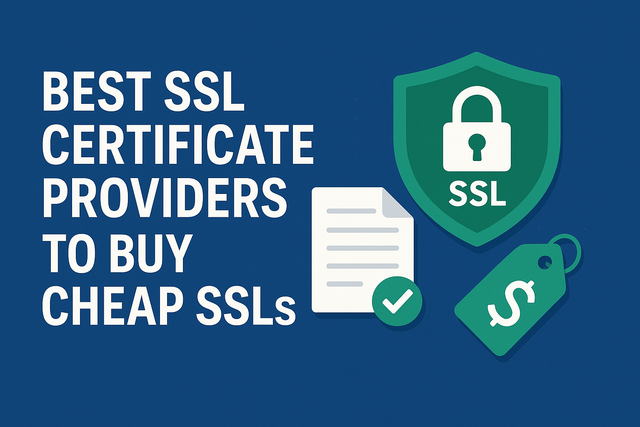
Top 5 Best SSL Certificate Providers to Buy Cheap SSLs for 2026
In today’s digital era, SSL Certificate Providers play a crucial role in securing websites, ensuring that sensitive user data like credit card details, passwords, and personal information remain encrypted and safe from cyber threats. With more businesses moving online in 2026, choosing the right SSL certificate provider has become vital for maintaining trust and compliance with search engine standards.
This guide will help you understand what SSL certificates are, the different types available, and the top SSL Certificate Providers for 2026 you can rely on for maximum protection, value, and performance.
Table of Content
- 1 What Is an SSL?
- 2 What Is an SSL Certificate?
- 3 Why You Need SSL Certificates in 2026
- 4 Where to Buy an SSL Certificate?
- 5 Best Sites to Buy Cheap SSL Certificates
- 6 Top 5 Best SSL Certificate Providers for 2026
- 7 Comparison Table: Top SSL Certificate Providers 2026
- 8 How to Choose the Right SSL Certificate Provider
- 9 Types of SSL Certificates by Validation
- 10 Types of SSL Certificates by Usage
- 11 Installation and Renewal Process of SSL Certificate
- 12 Benefits of Using SSL Certificates
- 13 Future Trends in SSL and Web Security (2026 and Beyond)
- 14 Conclusion
- 15 FAQs – Cheap SSL Certificate Providers
- 15.1 What is an SSL certificate and why is it important?
- 15.2 How do SSL Certificate Providers work?
- 15.3 Which are the best SSL Certificate Providers for 2026?
- 15.4 What are the main types of SSL certificates?
- 15.5 How much does an SSL certificate cost?
- 15.6 Can I get a free SSL certificate for my website?
- 15.7 What is the difference between DV, OV, and EV SSL certificates?
- 15.8 Does having an SSL certificate improve SEO rankings?
- 15.9 How long does it take to issue an SSL certificate?
- 15.10 Can one SSL certificate secure multiple domains?
- 15.11 What happens if my SSL certificate expires?
- 15.12 Are SSL certificates required for all websites?
- 15.13 Which SSL certificate is best for e-commerce websites?
- 15.14 How do I install an SSL certificate on my website?
- 15.15 What trends are shaping SSL certificates in 2026?
- 15.16 Related Posts
What Is an SSL?
SSL stands for Secure Sockets Layer, a protocol designed to establish a secure and encrypted connection between a web browser and a web server. It ensures that any data transmitted between the two remains confidential and tamper-proof.
In simple terms, SSL acts as a digital shield that protects communication between users and websites. When SSL is active, you’ll notice a padlock symbol in the browser’s address bar, along with an “https://” prefix instead of “http://”. This indicates a secure connection.
What Is an SSL Certificate?
An SSL certificate is a digital document issued by a trusted Certificate Authority (CA). It validates the authenticity of a website and enables encryption for data transferred over the internet.
When you install an SSL certificate, it confirms your website’s identity, builds trust with visitors, and secures sensitive data. SSL certificates are essential for all websites—especially e-commerce stores, financial institutions, and online service platforms that collect personal or payment information.
Moreover, Google gives ranking preference to websites with SSL certificates, making it a critical component for SEO and credibility.
Why You Need SSL Certificates in 2026
In 2026, cybersecurity concerns have intensified. With hackers using more sophisticated methods, SSL Certificate Providers have upgraded encryption standards to keep websites safe. SSL certificates are no longer optional; they’re a must-have for:
- Protecting user data from interception.
- Building customer trust and confidence.
- Enhancing website SEO and visibility.
- Complying with privacy laws like GDPR.
- Preventing “Not Secure” browser warnings.
Where to Buy an SSL Certificate?
When it comes to purchasing an SSL certificate, you have two main choices: directly from Certificate Authorities (CAs) or through reseller platforms.
Buying directly from top SSL Certificate Providers ensures authenticity, customer support, and faster issuance. However, buying from authorized resellers can save you money since they often offer bulk discounts and promotional deals.
Best Sites to Buy Cheap SSL Certificates
If you’re on a budget but don’t want to compromise on quality, there are several reputable sites offering cheap SSL certificates without sacrificing security. Some popular choices include:
- Sectigo
- GeoTrust
- DigiCert
- GlobalSign
- GoDaddy
These platforms provide easy installation, customer support, and affordable pricing for small businesses and startups.
Top 5 Best SSL Certificate Providers for 2026
Now, let’s dive into the most trusted SSL Certificate Providers for 2026 based on reliability, speed, support, and cost-effectiveness.
1. DigiCert – Best Overall SSL Certificate Provider
DigiCert remains one of the most trusted names in the SSL industry. Known for powering brands like Symantec, Thawte, and GeoTrust, DigiCert delivers enterprise-grade encryption and rapid validation processes.
Key Features:
- Industry-leading encryption strength (up to 256-bit).
- Supports all validation types: DV, OV, and EV.
- Excellent reputation for large corporations.
- Priority support and fast issuance.
- Compatible with all major browsers.
Why Choose DigiCert in 2026
DigiCert continues to lead the industry with innovations in post-quantum cryptography, ensuring your data remains protected even against future threats.
2. Sectigo (formerly Comodo) – Best for Budget Users
Sectigo, previously known as Comodo SSL, is one of the largest and most affordable SSL Certificate Providers in 2026. It’s perfect for startups, SMBs, and developers looking for reliable protection at competitive prices.
Key Features:
- Affordable pricing starting as low as $5/year.
- Wide range of SSL products including EV, DV, and Wildcard SSL.
- Free site seal and unlimited server licensing.
- Fast issuance and easy installation.
Why Choose Sectigo in 2026
It offers a balance between affordability and strong encryption, making it ideal for small businesses looking to secure their websites without overspending.
3. GeoTrust – Best for Mid-Sized Businesses
GeoTrust offers a great mix of affordability and enterprise-grade protection, making it one of the top SSL Certificate Providers in 2026 for growing businesses.
Key Features:
- Offers DV, OV, and EV SSL certificates.
- Provides a dynamic trust seal for customer reassurance.
- Quick verification and issuance process.
- Backed by DigiCert’s trusted infrastructure.
Why Choose GeoTrust in 2026
GeoTrust provides strong encryption and flexible options, making it an excellent choice for mid-sized companies managing multiple websites or e-commerce stores.
4. GlobalSign – Best for Enterprise-Level Security
GlobalSign is another top-tier SSL Certificate Provider known for its scalable and high-assurance digital certificates. It’s a preferred choice for large organizations that require identity management and cloud security integrations.
Key Features:
- Strong enterprise-grade authentication.
- Trusted root certificates recognized globally.
- Supports S/MIME, document signing, and IoT solutions.
- Automated certificate lifecycle management tools.
Why Choose GlobalSign in 2026
GlobalSign’s automation and scalability make it perfect for organizations handling hundreds or thousands of certificates simultaneously.
5. GoDaddy – Best for Ease of Use
GoDaddy is widely known as a hosting and domain giant, but it also stands out as one of the best SSL Certificate Providers in 2026 for its simplicity and support.
Key Features:
- One-click SSL installation for hosted domains.
- 24/7 expert customer support.
- Strong 2048-bit encryption and SHA-2 algorithm.
- Free SSL renewal reminders and management tools.
Why Choose GoDaddy in 2026
Its user-friendly interface and integration with GoDaddy hosting make SSL management simple, even for beginners.
Comparison Table: Top SSL Certificate Providers 2026
SSL Provider |
Validation Levels |
Starting Price |
Best For |
Notable Feature |
| DigiCert | DV, OV, EV | $99/year | Enterprises | Quantum-ready encryption |
| Sectigo | DV, OV, EV | $5/year | Small Businesses | Affordable SSL packages |
| GeoTrust | DV, OV, EV | $70/year | Mid-Sized Firms | Dynamic site seal |
| GlobalSign | OV, EV | $100/year | Corporates | Enterprise scalability |
| GoDaddy | DV, OV, EV | $64/year | Beginners | Easy setup tools |
How to Choose the Right SSL Certificate Provider
Selecting the right SSL certificate depends on your website’s purpose, traffic, and trust requirements. Here’s what to consider:
- Validation Type: Choose DV for blogs, OV for companies, and EV for e-commerce.
- Budget: Compare providers for discounts and reseller deals.
- Warranty: Some providers offer warranties up to $1.5 million.
- Customer Support: Ensure 24/7 assistance is available.
- Renewal Process: Automated renewal saves time and avoids downtime.
Types of SSL Certificates by Validation
When selecting from SSL Certificate Providers, it’s essential to understand the different validation levels. Each type provides a unique degree of trust and verification.
1. Domain Validated (DV) SSL Certificates
DV certificates are the most basic and fastest to obtain. The Certificate Authority verifies domain ownership, making them ideal for blogs, small websites, or personal portfolios.
2. Organization Validated (OV) SSL Certificates
OV certificates require additional verification of the organization’s identity. They display verified business details and are suitable for companies that need to establish stronger trust with users.
3. Extended Validation (EV) SSL Certificates
EV certificates are the highest level of validation. They show the company name directly in the browser’s address bar and provide maximum assurance to visitors. These are perfect for e-commerce and financial institutions that handle sensitive transactions.
Types of SSL Certificates by Usage
SSL certificates can also be categorized by how they are used across domains and subdomains.
1. Single-Domain SSL Certificates
This type secures one domain name only, such as “example.com.” It’s ideal for small websites that don’t have subdomains.
2. Wildcard SSL Certificates
A Wildcard SSL secures a primary domain and all its subdomains (e.g., “blog.example.com” and “store.example.com”). It’s great for businesses with multiple sections under the same domain.
3. Multi-Domain SSL Certificates (MDC)
Multi-Domain SSL certificates can secure multiple domain names under one certificate, such as “example.com,” “example.net,” and “example.org.” They’re perfect for businesses managing several brands or projects.
Installation and Renewal Process of SSL Certificate
Installing an SSL certificate is now easier than ever. Most SSL Certificate Providers offer automated tools or step-by-step guides.
Steps include:
- Generate a CSR (Certificate Signing Request).
- Submit it to the provider for validation.
- Download and install the issued certificate.
- Configure your server to use HTTPS.
For renewals, most providers send reminders before expiration. Always renew before the expiry date to prevent “Not Secure” warnings.
Benefits of Using SSL Certificates
SSL certificates offer far more than just security:
- Improved SEO: Google ranks HTTPS sites higher.
- User Trust: The padlock symbol reassures visitors.
- Data Integrity: Prevents data tampering.
- Compliance: Meets requirements for GDPR, PCI DSS, etc.
- Boosted Conversions: Visitors trust and transact more securely.
Future Trends in SSL and Web Security (2026 and Beyond)
The future of SSL lies in automation, AI-driven certificate management, and quantum-proof encryption. SSL Certificate Providers are shifting toward continuous authentication models to ensure no lapses in website protection.
Expect to see more integration with Zero Trust security frameworks and automated SSL renewals. In 2026, security isn’t just a choice—it’s the foundation of brand reputation.
Conclusion
Choosing from the best SSL Certificate Providers in 2026 ensures that your website remains secure, trusted, and SEO-friendly. Whether you run a small blog, an e-commerce store, or a corporate portal, SSL encryption is the backbone of digital trust.
Providers like DigiCert, Sectigo, GeoTrust, GlobalSign, and GoDaddy lead the industry with cutting-edge technology, affordable plans, and top-tier customer support.
In short, investing in a reliable SSL certificate is investing in your brand’s security, credibility, and long-term success.
FAQs – Cheap SSL Certificate Providers
What is an SSL certificate and why is it important?
An SSL certificate encrypts data exchanged between a website and its users. It ensures privacy, builds trust, and prevents data theft. Having SSL also boosts SEO rankings and removes browser “Not Secure” warnings, improving overall site credibility and conversions.
How do SSL Certificate Providers work?
SSL Certificate Providers issue digital certificates that verify your website’s identity and enable encrypted data transfer. They validate your domain or organization, sign the certificate digitally, and ensure browsers trust your site for secure, safe, and authenticated online communication.
Which are the best SSL Certificate Providers for 2026?
The top SSL Certificate Providers for 2026 include DigiCert, Sectigo, GeoTrust, GlobalSign, and GoDaddy. They offer trusted encryption, fast validation, and strong support, suitable for individuals, small businesses, and enterprise-level organizations seeking top-tier web security solutions globally.
What are the main types of SSL certificates?
SSL certificates come in three validation levels—Domain Validation (DV), Organization Validation (OV), and Extended Validation (EV). They also vary by usage type, such as Single-Domain, Wildcard, and Multi-Domain SSL, offering flexible protection for diverse website security needs.
How much does an SSL certificate cost?
The price of SSL certificates varies by provider and validation type. Basic DV certificates start around $5 per year, while premium EV or Wildcard SSL certificates can cost between $70 and $300 annually, depending on provider and warranty coverage.
Can I get a free SSL certificate for my website?
Yes, free SSL certificates are available through platforms like Let’s Encrypt. They provide basic encryption for websites but lack extended validation or warranties. For long-term trust and advanced security, premium SSL certificates from reputable providers are highly recommended.
What is the difference between DV, OV, and EV SSL certificates?
DV SSL validates domain ownership only, OV SSL verifies business identity, and EV SSL provides the highest trust by displaying the company name in the address bar. EV is best for e-commerce, while DV suits smaller or personal websites.
Does having an SSL certificate improve SEO rankings?
Yes, Google favors HTTPS-secured websites, offering them higher ranking potential. An SSL certificate not only builds user trust but also enhances search engine visibility. Sites with SSL often experience better engagement, lower bounce rates, and improved overall website credibility.
How long does it take to issue an SSL certificate?
The issuance time varies by validation type. DV SSLs are typically issued within minutes, OV certificates take a few hours, while EV SSL certificates can require one to five business days for detailed business verification and authentication checks.
Can one SSL certificate secure multiple domains?
Yes, a Multi-Domain SSL (MDC) certificate can secure several domains under one license. It’s ideal for businesses managing multiple websites, helping reduce cost and administrative effort while maintaining consistent encryption and brand trust across all digital properties.
What happens if my SSL certificate expires?
If an SSL certificate expires, your site loses its secure HTTPS connection. Visitors will see “Not Secure” warnings, and encrypted data becomes vulnerable. Always renew before expiry to maintain trust, security, and continuous encrypted protection for users.
Are SSL certificates required for all websites?
Yes, every website should have an SSL certificate. It’s essential for data security, SEO ranking, and user trust. Even blogs and informational sites benefit from SSL by avoiding browser warnings and maintaining credibility with visitors and search engines.
Which SSL certificate is best for e-commerce websites?
Extended Validation (EV) SSL certificates are best for e-commerce sites. They display the business name in browsers, proving authenticity and boosting buyer confidence. EV SSL ensures strong encryption for sensitive payment and customer data, reducing fraud and chargeback risks.
How do I install an SSL certificate on my website?
Installation involves generating a CSR, submitting it to your provider, downloading the issued certificate, and configuring your web server. Most SSL Certificate Providers offer automated tools or support documentation to make installation simple and error-free for all users.
What trends are shaping SSL certificates in 2026?
In 2026, SSL trends focus on automation, AI-powered validation, and quantum-resistant encryption. Providers emphasize continuous authentication and lifecycle management, helping websites maintain uninterrupted security, improved compliance, and advanced protection against evolving cyber threats and future digital risks.


